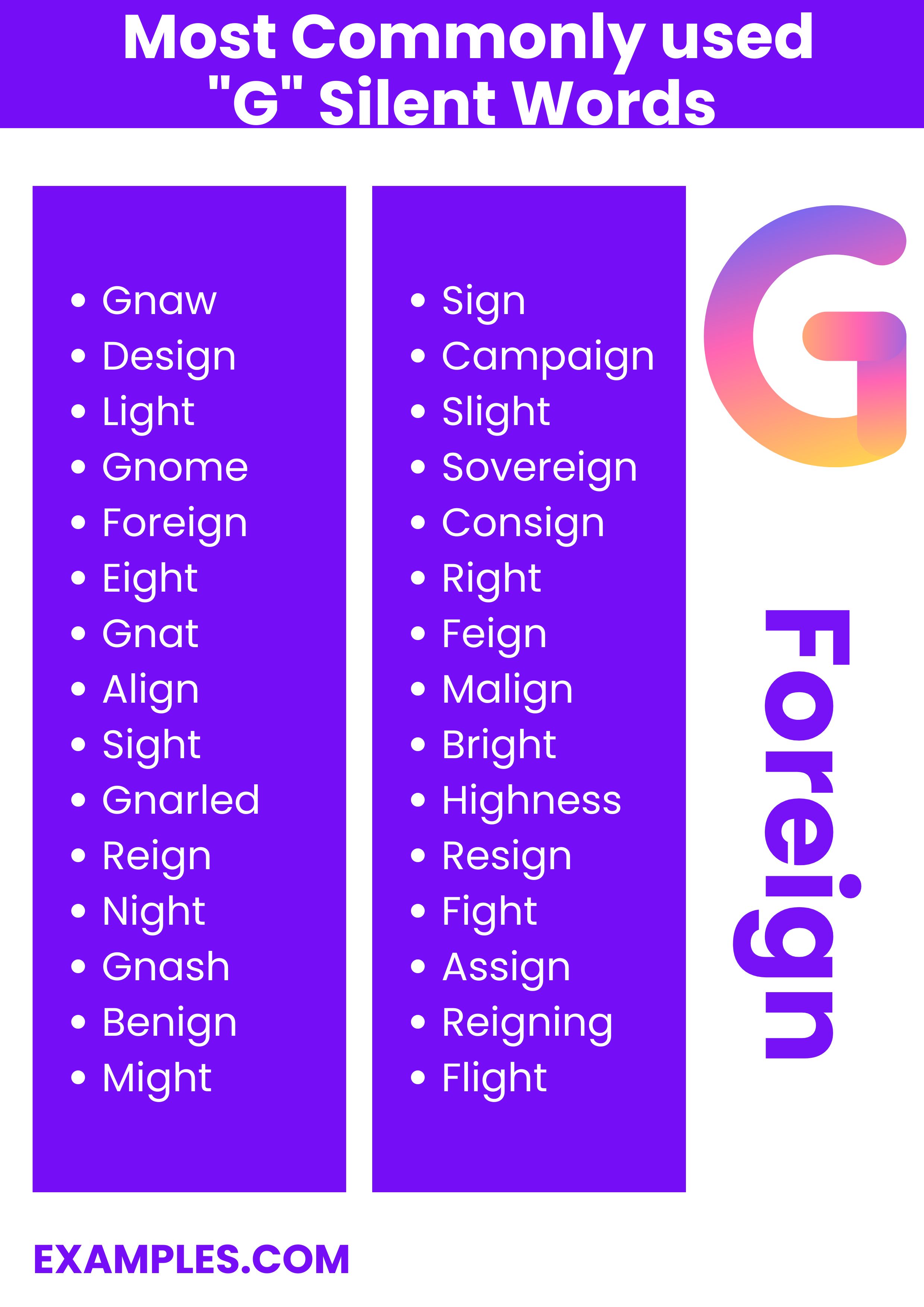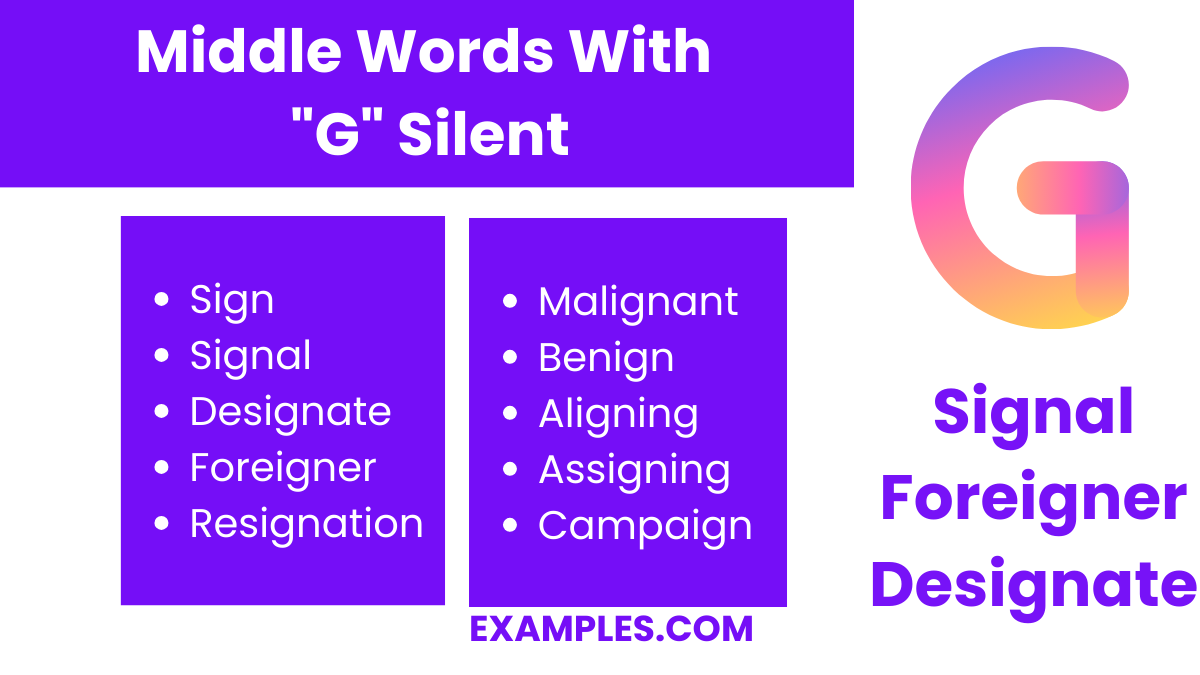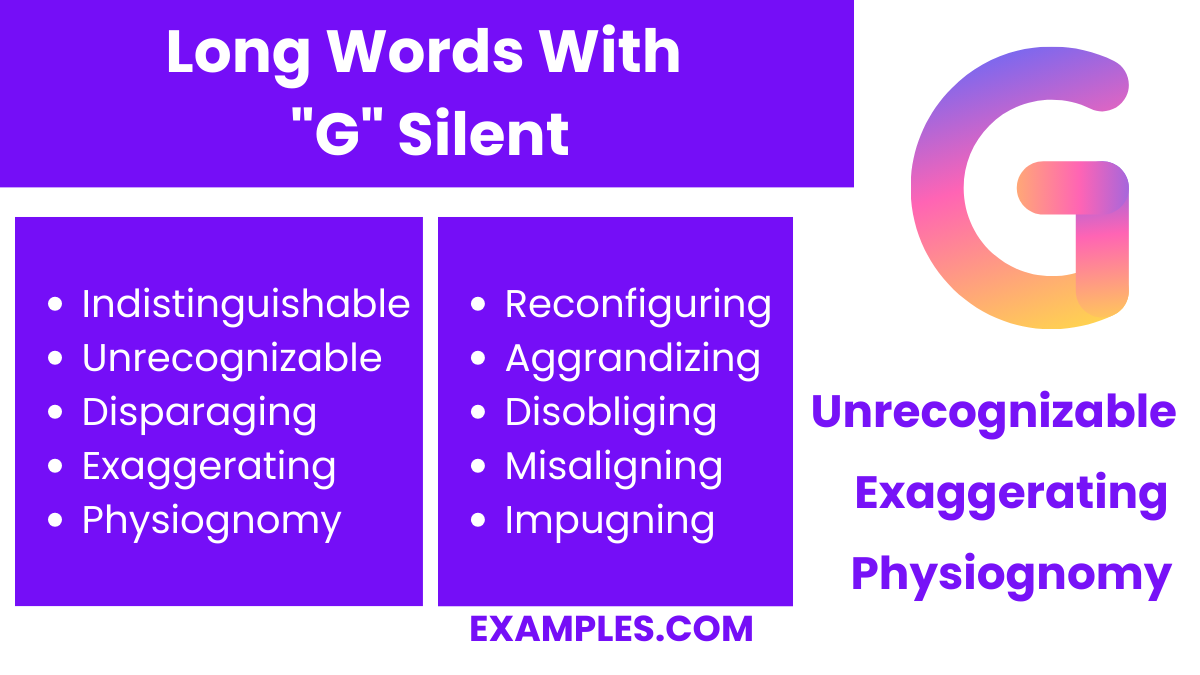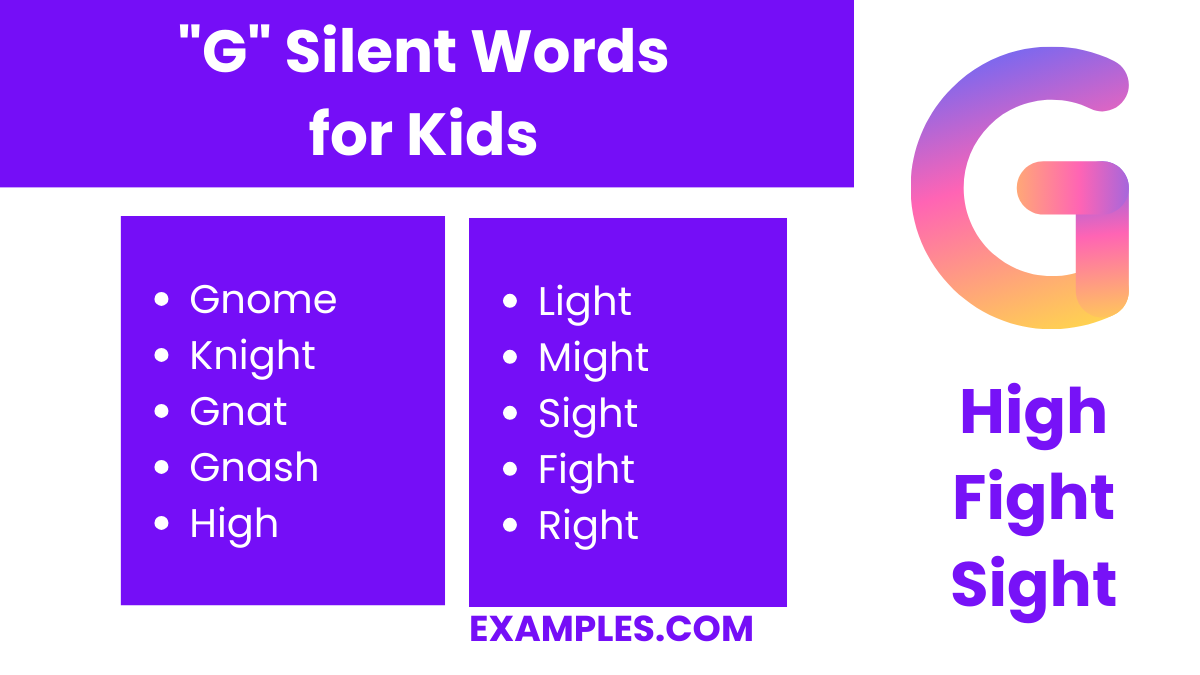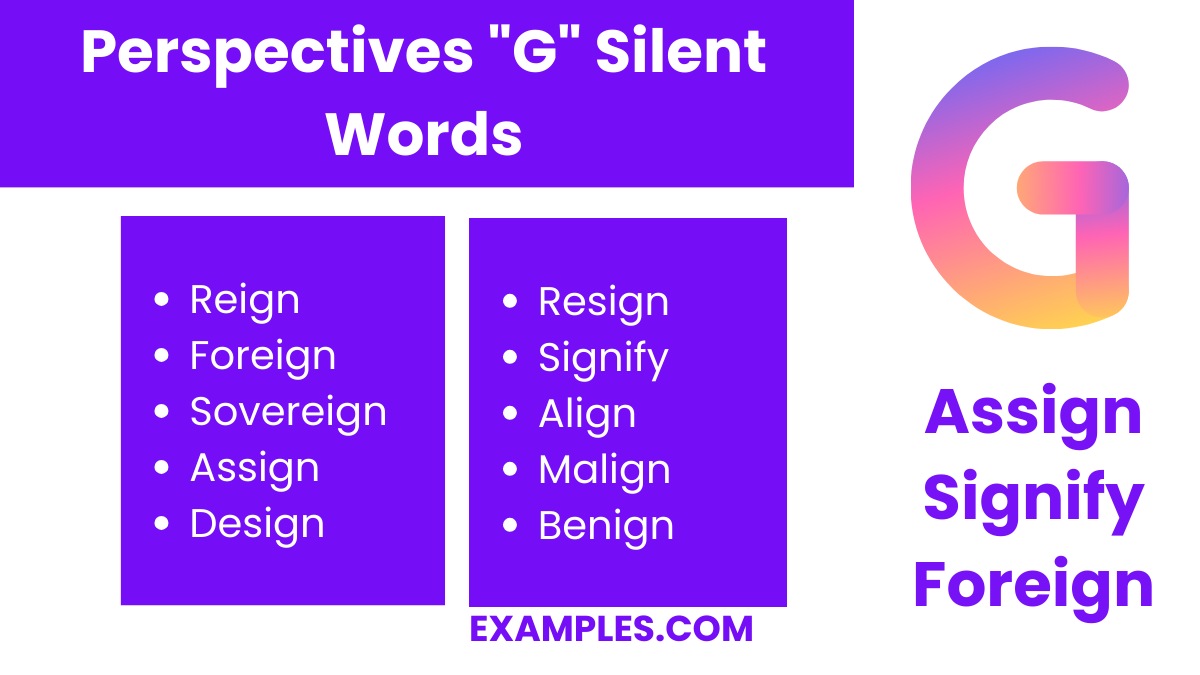“G” Silent Words
The English language, silent ‘G’ words stand out as intriguing threads woven with subtlety and grace. These G words, where the ‘G’ remains an unspoken enigma, challenge conventional pronunciation rules, adding a layer of sophistication and mystery to our vocabulary. From the gentle beginnings of ‘gnat’ to the silent echoes in ‘gnostic’, each word invites us into a realm where letters whisper their presence without making a sound. Exploring these words not only enriches our linguistic repertoire but also deepens our appreciation for the complexities and nuances of English.
Download Most Commonly Used G Silent Words - PDF
30 Most Commonly used “G” Silent Words
The English language is peppered with words where the ‘G’ remains silent, creating a unique challenge in pronunciation and spelling, especially within daily use English words. These words, often inherited from other languages or evolved over time, showcase the complexity and richness of English. Mastering them can significantly enhance one’s vocabulary and understanding of linguistic nuances. Below is a comprehensive list of commonly used silent “G” words, complete with phonetic transcriptions, aimed at aiding learners in their pronunciation and integration into daily language use.
| gnaw | [nɔː] | design | [dɪˈzaɪn] | light | [laɪt] |
| gnome | [noʊm] | foreign | [ˈfɒrɪn] | eight | [eɪt] |
| gnat | [næt] | align | [əˈlaɪn] | sight | [saɪt] |
| gnarled | [nɑːrld] | reign | [reɪn] | night | [naɪt] |
| gnash | [næʃ] | benign | [bɪˈnaɪn] | might | [maɪt] |
| sign | [saɪn] | campaign | [kæmˈpeɪn] | slight | [slaɪt] |
| sovereign | [ˈsɒvrɪn] | consign | [kənˈsaɪn] | right | [raɪt] |
| feign | [feɪn] | malign | [məˈlaɪn] | bright | [braɪt] |
| highness | [‘haɪnəs] | resign | [rɪˈzaɪn] | fight | [faɪt] |
| assign | [əˈsaɪn] | reigning | [‘reɪnɪŋ] | flight | [flaɪt] |
Starting Words With “G” Silent
Dive into the intriguing world of English where the silent ‘G’ leads the way, challenging both teachers and students to explore the depths of language pronunciation. This collection, ideal for educational enrichment, showcases the silent ‘G’ at the start, offering a unique twist to conventional phonetics. Enhance your teaching toolkit with these words, perfect for developing advanced communication skills in students.
- Gnome [noʊm] – A mythical creature associated with earth and treasure guarding.
- Gnash [næʃ] – To grind teeth together in anger or frustration.
- Gnat [næt] – A small, biting fly.
- Gnu [nuː] – Also known as a wildebeest, found in Africa.
- Gnarl [nɑːrl] – To make a twisted or distorted shape.
- Gnostic [ˈnɒstɪk] – Pertaining to esoteric spiritual knowledge.
- Gnaw [nɔː] – To bite or chew on persistently.
- Gnarly [ˈnɑːrli] – Slang for something difficult, dangerous, or challenging; also used to describe something awesome in surfing culture.
- Gneiss [naɪs] – A type of metamorphic rock.
- Gnomic [ˈnoʊmɪk] – Pertaining to short, wise, and pithy sayings.
Ending Words With “G” Silent
Engage your students with the curious case of the silent ‘G’ at the end of words, an excellent way to introduce the unpredictable nature of English spelling and pronunciation, including the shifts between singular & plural words. These words provide a platform for discussion on historical language evolution and phonetic anomalies, making them invaluable for advanced language lessons.
- Assigning [əˈsaɪnɪŋ]: The act of allocating a task or responsibility to someone.
- Reigning [ˈreɪnɪŋ]: The present continuous form of the word “reign,” signifying the current rule of a sovereign or ruler.
- Signing [ˈsaɪnɪŋ]: The act of writing one’s name or placing a symbol to convey information or agreement.
- Designing [dɪˈzaɪnɪŋ]: The continuous process of creating and planning with artistic or functional intent.
- Resigning [rɪˈzaɪnɪŋ]: The act of voluntarily stepping down from a position or job.
- Maligning [məˈlaɪnɪŋ]: Engaging in the act of speaking ill of someone in a critical and harmful manner.
- Benigning [bɪˈnaɪnɪŋ]: Creating the continuous state of being gentle, kind, or not harmful in character.
- Signifying [ˈsɪɡnɪfaɪɪŋ]: The act of indicating or representing something; expressing a particular meaning.
- Log [lɒɡ] – A part of the trunk or a large branch of a tree that has fallen or been cut off.
- Aligning [əˈlaɪnɪŋ]: The act of arranging or positioning things in a straight and coordinated manner.
Middle Words With “G” Silent
Explore the enigmatic presence of the silent ‘G’ nestled within words, a fascinating topic for both teaching and learning, particularly when it comes to Pictionary words that add an element of fun to the educational process. These words, with their hidden letters, serve as perfect examples to illustrate the complexity and beauty of English phonetics, enriching students’ understanding and appreciation of language.
- Sign [saɪn] – A symbol or message designed to convey information.
- Signal [ˈsɪɡnəl] – A gesture, action, or sound used to convey information or instructions.
- Designate [ˈdɛzɪɡneɪt] – To officially assign a specified status or name.
- Foreigner [ˈfɒrɪnər] – A person born in or coming from a country other than one’s own.
- Resignation [ˌrɛzɪɡˈneɪʃən] – The act of resigning from a job or position.
- Malignant [məˈlɪɡnənt] – (Of a disease) very virulent or infectious.
- Benign [bɪˈnaɪn] – Gentle and kindly; (of a disease) not harmful in effect.
- Aligning [əˈlaɪnɪŋ] – Adjusting or forming in a straight line.
- Assigning [əˈsaɪnɪŋ] – Allocating or appointing to a task or duty.
- Campaign [kæmˈpeɪn] – A series of military operations intended to achieve a particular objective, confined to a particular area, or involving a specified type of fighting.
Long Words With “G” Silent
Delve into the world of silent ‘G’ with these long and intriguing difficult words, perfect for expanding the vocabulary of advanced learners. These terms not only challenge pronunciation skills but also enrich linguistic understanding, making them excellent resources for teachers aiming to deepen their students’ engagement with English. Explore these examples to add a touch of complexity and sophistication to language lessons, navigating through the subtleties of silent letters that embody the rich tapestry of the language’s evolution and diversity.
- Indistinguishable [ˌɪndɪˈstɪŋɡwɪʃəbl] – Unable to be identified as different or distinct.
- Unrecognizable [ˌʌnrɪˈkɒɡnaɪzəbl] – Not able to be recognized or identified.
- Disparaging [dɪˈsparɪdʒɪŋ] – Expressing the opinion that something is of little worth; derogatory.
- Exaggerating [ɪɡˈzædʒəreɪtɪŋ] – Representing something as being larger, greater, better, or worse than it really is.
- Physiognomy [ˌfɪziˈɒnəmi] – A person’s facial features or expression, especially when regarded as indicative of character.
- Reconfiguring [ˌriːkənˈfɪɡjərɪŋ] – Arrange or shape (something) differently or again.
- Aggrandizing [əˈɡrændaɪzɪŋ] – Increasing the power, status, or wealth of.
- Disobliging [ˌdɪsəˈblaɪdʒɪŋ] – Deliberately unhelpful; uncooperative.
- Misaligning [ˌmɪsəˈlaɪnɪŋ] – Placing or arranging (things) out of line or alignment.
- Impugning [ɪmˈpjuːnɪŋ] – Dispute the truth, validity, or honesty of (a statement or motive); call into question.
Short Words With “G” Silent
The English language is filled with quirks and idiosyncrasies, one of which is the presence of silent letters in words. These silent letters often pose challenges to learners, especially when they are just beginning to navigate the complexities of English pronunciation and spelling. The silent “g” is a prime example, typically found in words that have been borrowed from other languages or that have evolved in such a way that the pronunciation has changed over time. For teachers looking to expand their students’ vocabulary and improve their pronunciation skills, focusing on short words with a silent “g” can be a great starting point. Not only does this help students understand the intricacies of English phonetics, but it also aids in enhancing their reading and spelling abilities. Below, we present a list of ten short words with a silent “g”, complete with definitions and phonetic pronunciations, aimed at supporting educators in their mission to foster effective communication skills among students.
- gnat (næt) – a small biting fly.
- gnaw (nɔː) – to bite at or nibble something persistently.
- sign (saɪn) – a symbol or indication of something.
- align (əˈlaɪn) – to place or arrange in a straight line.
- reign (reɪn) – the period during which a sovereign rules.
- design (dɪˈzaɪn) – to plan and make something artistically or skillfully.
- resign (rɪˈzaɪn) – to voluntarily leave a job or office.
- foreign (ˈfɒrɪn) – belonging to a country other than one’s own.
- assign (əˈsaɪn) – to allocate a task or duty to someone.
- campaign (kæmˈpeɪn) – a series of actions aimed at achieving a particular goal, especially in politics or business.
“G” Silent Words for Kids
Exploring silent “G” words with children opens a fascinating avenue to deepen their understanding of English spelling and pronunciation. It’s a playful challenge that encourages curiosity about why some letters are not pronounced. Teaching silent “G” words not only enriches a child’s vocabulary but also enhances their phonetic skills, crucial for reading fluency and comprehension. This list of words, specifically chosen for young learners, aims to provide teachers with resources to introduce the concept of silent letters in an engaging way. Each word is accompanied by a simple definition to help kids grasp its meaning easily, making learning a fun part of their linguistic journey.
- gnome – A small mythical creature resembling a tiny old man.
- knight – A man awarded a non-hereditary title by a monarch or other political leader for service to the monarch or country.
- gnat – A small flying insect that bites.
- gnash – To grind one’s teeth together, typically as a sign of anger.
- high – Having a great or considerable extent upward.
- light – The natural agent that stimulates sight and makes things visible.
- might – Used to express possibility or power.
- sight – The ability to see; the visual faculty.
- fight – A violent confrontation or struggle.
- right – Morally good, justified, or acceptable
Perspectives “G” Silent Words
Unlock the potential of silent ‘G’ words to broaden perspectives and enrich conversations in your classroom. These carefully selected terms not only challenge students’ pronunciation skills but also invite them to explore diverse viewpoints and complex concepts. Ideal for stimulating critical thinking and enhancing communication, this list is a valuable resource for teachers dedicated to cultivating well-rounded, articulate students.
- Reign [reɪn] – The period during which a sovereign rules.
- Foreign [ˈfɒrɪn] – Belonging to or characteristic of a country other than one’s own.
- Sovereign [ˈsɒvrɪn] – A supreme ruler, especially a monarch.
- Assign [əˈsaɪn] – To allocate a task or duty to someone.
- Design [dɪˈzaɪn] – To plan and make decisions about the form and function of something.
- Resign [rɪˈzaɪn] – To voluntarily leave a position or job.
- Signify [ˈsɪɡnɪfaɪ] – To be an indication of something; to mean.
- Align [əˈlaɪn] – To place or arrange things in a correct or appropriate relative position.
- Malign [məˈlaɪn] – To speak about someone in a spitefully critical manner.
- Benign [bɪˈnaɪn] – Gentle and kind; not harmful in effect.
In conclusion, exploring words with silent “G” unveils the quirks and intricacies of the English language, enriching both vocabulary and pronunciation skills. This journey through silent “G” words not only enhances linguistic understanding but also fosters a deeper appreciation for language’s nuances. Embrace these silent letters as gateways to more articulate and expressive communication skills, perfect for learners at any level



